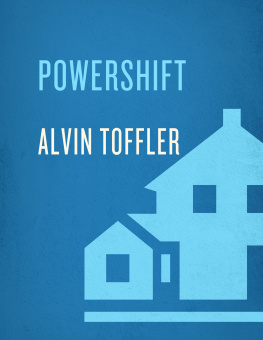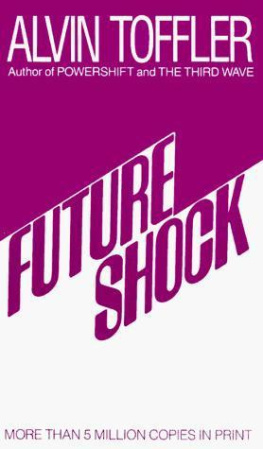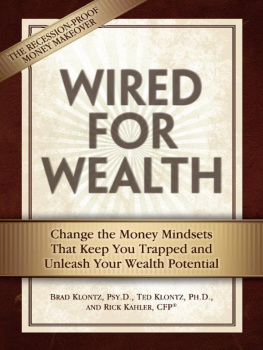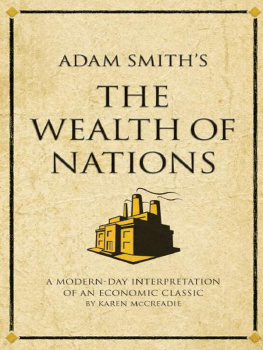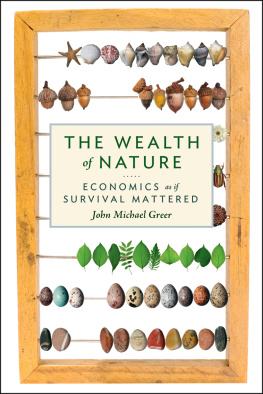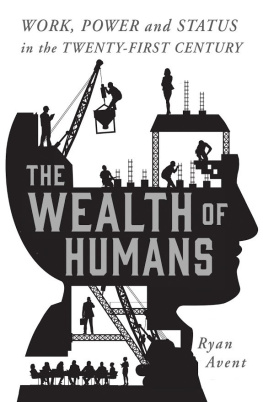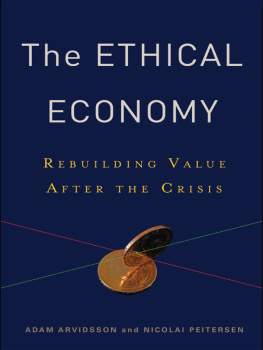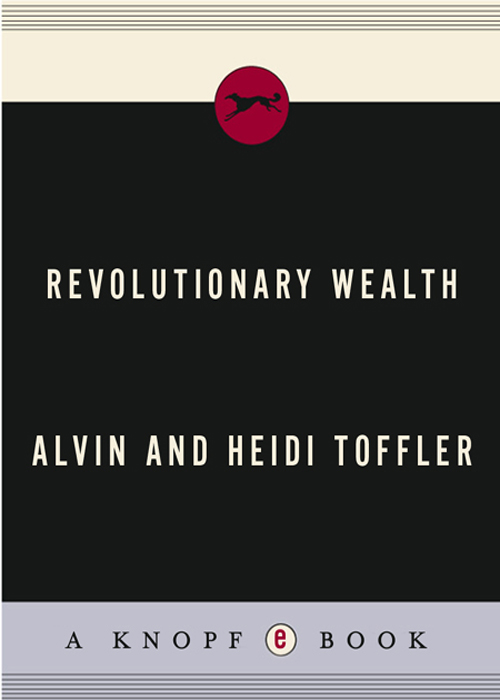
Contents
Revolutionary Wealth
Alvin Toffler and Heidi Toffler

ALFRED A. KNOPF NEW YORK 2006
INTRODUCTION
All books are written over a span of timethat interval between conception in the authors mind and birth in print. And just as an embryo in a mothers womb is affected by what happens outside the womb, a book in process is necessarily affected by events that make an impression on the writer during gestation. To that degree, even a book about the future is inescapably a product of its own slice of history.
The slice it took to write this book was the twelve years bracketing the arrival of the twenty-first century, and no reasonably alert person interested in the world could have escaped the dramatic headlines during that period. An obscure cults murderous sarin attack on the Tokyo subway; the cloning of Dolly the sheep; the impeachment of Bill Clinton; the decoding of the human genome; the nonoccurrence of a dreaded millennial attack on our computers; the spread of AIDS, SARS and other diseases; the 9/11 attack; the war in Iraq; the great tsunami of 2004, followed by Hurricane Katrina in 2005.
These news stories were matched by economic and business drama as wellthe Asian crisis of 199798; the dot-com rise, crash and stock market comeback; the introduction of the euro; runaway oil prices; a succession of corporate scandals; out-of-sight U.S. fiscal and trade deficits; and, above all, the ascent of China.
Yet even with all the reportage on business and economics bombarding us in print, online, on TV and on our mobile phones, the biggest story of alla historic transformation of wealthwas missed or buried in an avalanche of less important factoids. Our task in these pages is to tell that missing story.
Wealth does not arise only from fields, factories, offices and machines. And revolutionary wealth is not just about money.
By now even the dimmest observers recognize that the United States and numerous other countries are transitioning to brain-driven knowledge economies. But the full impact of this changeon individuals and on whole countries and continentshas yet to be felt. The past half century has merely been prologue.
The importance of knowledge in wealth creation has steadily grown and is now about to leap to a much higher level and cross additional borders as more and more parts of the world plug in to an ever growing, ever changing, ever more accessible planetary brain bank. As a result, we will all, rich or poor, be living and working with revolutionary wealth or its consequences.
The term revolution is tossed around so casually these days, attached to new diets and political upheavals alike, that much of its meaning has drained away. In this book, we use the word in its broadest meaning. Compared with the scale of revolution we now face, a collapse of the stock market or a change of regime, the introduction of new technologies, even wars and the breakup of nations dont qualify.
The revolutionary change we focus on in these pages is an upheaval similar to but even more sweeping than the industrial revolutionwhen thousands of seemingly unrelated changes came together to form a new economic system, accompanied by nothing less than a new way of life, a new civilization, called modernity.
For wealth to be regarded as truly revolutionary, it has to be transformed not just in quantity, but in how it is created, allocated, circulated, spent, saved and invested. In addition, as well explain later, the degree to which it is tangible or intangible must be altered. Only when changes happen at all these levels can we justifiably call wealth revolutionary.
Today, as well show, all that is in fact happeningat unprecedented speed and on a global scale.
As to the other word in the titlewealth: While almost all of us live in a money economy, wealth, in these pages, refers not just to money. We also live in a fascinating, largely unexplored, parallel economy. In it, we fulfill many vital needs or wants without pay. It is the combination of these twothe money and the non-money economiesthat together form what we will call in these pages the wealth system.
By simultaneously revolutionizing both of these interacting economies, we are creating a powerful, historically unprecedented wealth system.
To grasp the significance of this, we need to recognize that no wealth system exists in isolation. A wealth system is only one component, although a very powerful one, of a still larger macrosystem whose other componentssocial, cultural, religious, politicalare in constant feedback with it and with one another. Together they form a civilization or way of life roughly compatible with the wealth system.
For this reason, when we speak here about revolutionary wealth, we constantly bear in mind its links with all these other subsystems. To revolutionize wealth, then, as we are doing, is to introduce changeand resistance from vested interestsin all these and many other spheres of life as well.
Revolutionary wealth rests on these core ideas which, once grasped, can help us make sense of the colliding, seemingly senseless changes and conflicts raging around us.
While not economists by profession, we have spent the better part of our careers writing about economic and social policy, development strategy and business issues. Along the way, we have lectured at innumerable universities, testified before the Joint Economic Committee of the U.S. Congress, met with corporate leaders around the globe, and advised presidents and prime ministers on the transition from an industrial to a high-tech, knowledge-based economy.
But economics, even more than other disciplines, needs a grounding in real life. For each of us, real life in our youth included five unforgettable years working in factories, on punch presses and assembly lines; making automobiles, aircraft engines, lightbulbs, engine blocks and other products; crawling through ducts in a steel foundry, jackhammering and performing other forms of physical labor. We learned about manufacturing as seen from the bottom. We also know, firsthand, what it feels like to be unemployed.
Since the appearance of Future Shock, the first of our books about change and the future, its publication in approximately one hundred countries has given us extraordinary face-to-face access to people in every walk of lifechildren in Venezuelan slums, Brazilian favelas and Argentinean villasmiserias; billionaires in Mexico, Japan, India and Indonesia; imprisoned female murderers in California; finance ministers and central bankers; and Nobel Prize winnersnot to mention kings and queens. In all, they represent many personality types, every religion (and none), every political ideology, every degree of greed or social concern, idealism and cynicism. These varied experiences have provided a real-life context for all economic abstractions.
Of course, no one knows the futureespecially when something will happenwith certainty. That is why throughout these pages the term will, as in will happen, should always be recognized as a shorthand version of probably will or in our opinion will. That saves us from continually repeating these reservations and qualifications and putting the reader to sleep.
It is also worth bearing in mind that facts have shorter and shorter life spans these days and people move up, down and around, so that an executive identified with corporation A or a professor with university B may already have transferred to corporation or college C by the time this book is read. In addition, readers should not forget one inescapable reality: All explanations are simplifications.
Next page

